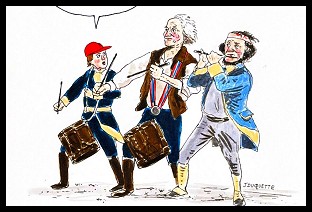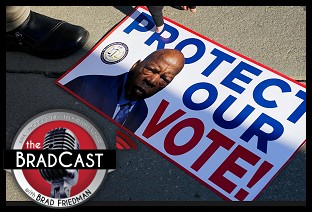READER COMMENTS ON
"MO's Democratic Governor Jay Nixon Discourages Quitting Smoking With Veto of E-Cig Bill"
(13 Responses so far...)
COMMENT #1 [Permalink]
...
Jim Spriggs
said on 7/14/2014 @ 6:57 pm PT...
Brad says:
"I was able to quit, literally over night, thanks to vaping. I haven't had a cigarette in almost a year and a half, and don't want one."
(I will always remember your hard-boiled, muckraking investigative reporter photo, Brad).
My wife has been smoking for decades. I thought she would quit around the same time I did--1981. But, noooo...
Until about 2 years ago. She started vaping, and the same thing: I suddenly stopped being her connection to a drug pusher by the name of R.J. Reynolds (via the liquor store). An added bonus is I haven't bought any lottery tickets for the last 2 years either.
COMMENT #2 [Permalink]
...
Roy Lipscomb
said on 7/14/2014 @ 9:09 pm PT...
Brad wrote:
While Koretz was unable to cite evidence of any actual dangers of e-cigs --- in fact, the science to date shows quite the opposite --- he admitted, near the end of our conversation, that current evidence suggests what he describes as a "99% possibility" that vaping is "much safer" than smoking.
[Emphasis added]
The "date" of the contents of the scientific article cited above was August 2013, almost twelve months ago.
Unfortunately, more recent studies have cast doubt on the healthiness of e-cigs.
Here are some excerpts from a report from three weeks ago: "Health risks of e-cigarettes emerge," Science News, June 28, 2014, p. 20.
(Online access to the report is available to Science News subscribers at https://www.sciencenews....isks-e-cigarettes-emerge )
“There’s no question that a puff on an e-cigarette is less toxic than a puff on a regular cigarette,” says Stanton Glantz, director of the Center for Tobacco Control Research and Education at the University of California, San Francisco. But few studies have looked at the toxicity of their vapors. As a result, scientists have been circumspect about describing e-cigarettes as safe....
Electronic cigarettes, marketed as safer than regular cigarettes, deliver a cocktail of toxic chemicals including carcinogens into the lungs, new studies show. Using e-cigarettes may even make bacterial infections resistant to antibiotics, according to one study....
For a May 13 [2014] review in Circulation [http://circ.ahajournals.org/content/129/19/1972.full ], Glantz and his team pored over emerging data on what vapers are inhaling and found, he says, greater risk than scientists had thought. E-cigarettes deliver high levels of nanoparticles, the researchers found, which can trigger inflammation and have been linked to asthma, stroke, heart disease, and diabetes (Science News, 7/18/09, p. 26). The levels “really raise concerns about heart disease and other chronic conditions where inflammation is involved,” he says....
...people may think vaping is safe, but FDA has seen no data establishing anything like that, writes the agency’s Priscilla Callahan-Lyon in the same journal [http://tobaccocontrol.bmj.com/content/23/suppl_2/ii36.abstract ]. She reviewed data from 18 studies on e-cigarettes’ vapors and found that most contain at least traces of the solvents in which nicotine and flavorings had been dissolved. Those solvents, she reports, are known as lung irritants.
And the solvents can transform into something even more worrisome: carbonyls. This group includes known cancer-causing chemicals, such as formaldehyde, and suspected carcinogens, such as acetaldehyde.
COMMENT #3 [Permalink]
...
Brad Friedman
said on 7/14/2014 @ 11:07 pm PT...
Roy Lipscomb @ 2 -
First, I'm quite familiar with Stanton Glantz (quoted at the top of your excerpt). He's spent his life fighting tobacco at UCSF, testifies at virtually every anti-vaping hearing (he's the Hans Von Spakovsky of the anti e-cig movement), and offers absurd interpretations of just about everything.
For example, one study he cited to the City Council in San Francisco (as I remember it) had found that a small sampling of high school kids surveyed in Japan had reported that almost every one of them that had ever tried vaping was also a smoker. From that, Glantz concluded, vaping is a gateway to smoking! I kid you not, that's actually what he testified to!
The article you excerpt highlights his study of studies. Most of the studies in it are, themselves, older than the one I cited which you describe as old. (That study was actually submitted for peer review last year in August 2013, and finally published in January of 2014.) The very first actual scientific report cited in the excerpt you share is from July 2009.
In any case, I've look at his report of reports, including via the Science News article you quote (had read both when they initially came out), and find it to be another example of terrible reporting, akin to the horrible one I detailed from the New York Times not long ago referencing e-juice as "Poison by the Barrel".
Just one example from the article you quote: "Electronic cigarettes, marketed as safer than regular cigarettes, deliver a cocktail of toxic chemicals including carcinogens into the lungs, new studies show." Bullshit. Studies show no such thing.
Those "nonoparticles" mentioned? Here's what the actual report, co-authored by Glantz himself and published in 2014, said about them, when one actually bothers to read the report (as I did):
...it is not clear whether the ultrafine particles delivered by e-cigarettes have health effects and toxicity similar to the ambient fine particles generated by conventional cigarette smoke or secondhand smoke. There is strong evidence, however, that frequent low or short-term levels of exposure to fine and ultrafine particles from tobacco smoke or air pollution can contribute to pulmonary and systemic inflammatory processes and increase the risk of cardiovascular and respiratory disease and death.
So, to translate: Not clear if particles from e-cigs have any health effects at all, but cigarettes and air pollution do, so avoid e-cigs!
Is that good science to you? Keep the above in mind, written this year in Glantz' actual report, and then read the quote from him again from the article you cited:
“There’s no question that a puff on an e-cigarette is less toxic than a puff on a regular cigarette,” says Stanton Glantz, director of the Center for Tobacco Control Research and Education at the University of California, San Francisco.
So, according to Glantz himself, no evidence that e-cig particles are dangerous (though those from cigarettes and air pollution are), and "an e-cigarette is less toxic than...a cigarette".
As I said, bad science and bad reporting from that journal.
COMMENT #4 [Permalink]
...
C C Harmon
said on 7/14/2014 @ 11:24 pm PT...
Concerning Roy's citation of a study by Stanton Glantz I would suggest some research on the author of the study. I understand that Mr. Glantz has an educational background as a mechanical engineer. He is referred to as "Doctor of Tobacco Control" by the University because of the large amount of government and pharmaceutical company grants he is able to procure on behalf of the university. I find that most of his work in the anti-tobacco field is very questionable and I have been following it for many years now.
http://www.illinoissmoke...antz_doctor_of_what.html or
http://antithrlies.com/2...-new-evidence-says-both/
COMMENT #5 [Permalink]
...
C C Harmon
said on 7/14/2014 @ 11:36 pm PT...
Appears you beat me to the punch, Brad. and did a much more thorough job. My first time to ever comment on any blog although I have been following you for years on election integrity issues.
C C Harmon
COMMENT #6 [Permalink]
...
mr.ed
said on 7/15/2014 @ 5:15 am PT...
So, ingested poisons nicotine and propylene glycol aren't harmful?
Get real.
COMMENT #7 [Permalink]
...
Brad Friedman
said on 7/15/2014 @ 11:17 am PT...
C C Harmon said @ 5:
My first time to ever comment on any blog although I have been following you for years on election integrity issues.
Don't be such a comment stranger, CC! Clearly you know stuff and I can't do all the heavy lifting around here! 
COMMENT #8 [Permalink]
...
Brad Friedman
said on 7/15/2014 @ 11:18 am PT...
Mr.Ed said @ 6:
So, ingested poisons nicotine and propylene glycol aren't harmful?
Get real.
Well, gosh, I hope not! Otherwise, one wonders why FDA-approved propylene glycol is used in all sorts of stuff from chapstick to asthma inhalers to fog machines (used in crowded clubs and theaters.)
As to "ingesting" nicotine, I hope that's not harmful either, since the FDA-approved use of it in Big Pharma's profitable smoking cessation tools like nicotine patches, gums and, yes, nicotine inhalers, might cost them a fortune if they had to get out of the business
COMMENT #9 [Permalink]
...
Dexter
said on 7/15/2014 @ 5:42 pm PT...
Brad,
I think the development of the e-cig is great for smokers who prefer to stop smoking, and it is great that you are in a better state with the e-cig. It's also great that they are available without a prescription, and that they can either be a step in breaking a nicotine addition, or as a substitute for those who like the nicotine.
However, your stance on the regulation issue seems to put you at odds with so many issues you have championed over the years.
From the several articles and comments you have written, your stance seems to be that use of e-cigs should not be regulated in public, and that there should be no regulation of the product until it is shown that they are injurious to second-hand users. It also seems to be that you are taking the tack that the vaporized nicotine products are so much safer than traditional tobacco products, that we should all embrace the unfettered use of the products as it represents an overall gain for us all.
My retort is thus:
Regarding the "prove-it" stance, this is just the stance that the tobacco companies used to push their products unfettered for decades before they were finally regulated. It's also the stance the National Lead Co. used to push lead paints for decades before they were regulated in the 1970's, and of of Johns Manville with asbestos insulation, etc etc. It's the opposite of the stance you take when advocating against fracking, or the canadian oil pipeline, etc etc.
Regarding the actual hazard, you seem to be assuming in your argument that the smoke from tobacco is the culprit in the product. However, there are several studies which implicate either the nicotine, or the combination of nicotine and smoke, as the culprit. That, for example, may be the reason why marijuana has a much lower association of health problems with regular use, even though it is also burned and inhaled. One explanation is that the nicotine acts as a lifeline for damaged cells in the lungs, preventing them from dying and sloughing away, which instead means they have a much greater chance at "going off" in the future. It would be a shame if we deregulated, then found out 20 years later that the nicotine is even half as dangerous as smoking, but it is a very likely scenario. There is also the danger of increased nicotine use with the perception that it is safe to inhale, when there really is no good evidence to say either way.
Also, nicotine is highly addictive in itself, which is of course why so many people have trouble quitting smoking. I know you would prefer to wait to see whether second-hand vapors are addictive via a long-term study, but it has already been clearly demonstrated that people have been addicted to second-hand smoke in the workplace, so it would be a stretch to claim that somehow, the second-hand vapors from your e-cig are not.
Just as with smoking, I would defend your right to use the e-cig, but I would also defend the right of the guy next to you to not have to use it, too. I don't see why you have such a problem with regulating the product in the same way as tobacco, it seems to me to have been a great success. I remember fondly all those soundbites of the bar-owners and restauranteurs all in a huff, predicting the end of their livelihood and the economic ripples we would all have to endure. I just wish the same logic went into regulating the production and use of fossil fuels, dangerous pesticides, etc...
Finally, our free market assures that e-cigs will be continually reformulated. And although you can guess they will never be purposefully formulated to hurt the user, you can be equally sure the marketers will not consider that possibility in any way whatsoever as they sell. They are selling a highly addictive product, and indications are that it is also injurious just by the fact that the user is inhaling nicotine into his lungs. They won't be too cautious about any additional ingredients.
I say, continue as you are (assuming you are abiding by the laws), and chill out about the regulations.
COMMENT #10 [Permalink]
...
Brad Friedman
said on 7/15/2014 @ 7:10 pm PT...
Dexter @ 9 wrote:
However, your stance on the regulation issue seems to put you at odds with so many issues you have championed over the years.
Nope. Not in the least. It's exactly the same.
Regarding the "prove-it" stance, this is just the stance that the tobacco companies used to push their products unfettered for decades before they were finally regulated. It's also the stance the National Lead Co. used to push lead paints for decades before they were regulated in the 1970's, and of of Johns Manville with asbestos insulation, etc etc.
I'm not an expert in the science of Lead and asbestos, but I do know that you are completely misrepresenting the science of tobacco. There had been an enormous number of scientific studies for years and years detailing the dangers of smoking. The dangers were not unknown (as they currently are with vaping), but the industry purposely hid their own science, lied about public science, and paid off legislators to turn the other way. NONE of those things are true about vaping. None.
I suspect the same issues existed when it came to lead paint and asbestos. If you have seen a scientific study on the dangers of vaping that you believe I'm not familiar with, feel free to share it. But to compare it to tobacco, lead and asbestos, and what we knew about them long before they were regulated in any way is simply and wholly an inaccurate comparison.
It's the opposite of the stance you take when advocating against fracking, or the canadian oil pipeline, etc etc.
Actually, I don't think I much advocate against either of those things. I have, however, reported on the findings of science and the dangers that are associated with both of them. Again, very bad comparison. If you need me to offer you details as to why on both counts (for fracking and tar sands oil), I can do so.
Regarding the actual hazard, you seem to be assuming in your argument that the smoke from tobacco is the culprit in the product.
I'm not. The scientific studies are. All I can do is read them.
However, there are several studies which implicate either the nicotine, or the combination of nicotine and smoke, as the culprit.
I've seen no such study which implicates nicotine. In this case, you'd be talking about aerosolized nicotine. I have seen studies which show that nicotine may lead to a 50% decrease in rates of Parkinson's and Alzheimer's however. That said, if you have any pointers to peer-reviewed studies citing aerosolized nicotine as a public safety hazard, I'm happy to look at them.
It would be a shame if we deregulated, then found out 20 years later that the nicotine is even half as dangerous as smoking, but it is a very likely scenario.
"Likely"? Really? Even though nicotine and smoking has been studied for almost 100 years?
It would also be a shame if unregulated Cool Ranch Doritos were found, in 20 years, to be a public safety hazard (they're delicious!). But we don't ban everything until longitudinal studies decades from now are unable to find any problems with it. Particularly when the use of that product is likely to save millions of lives.
When you describe my position on this as somehow different from other positions I may have on government regulation, you'll have to be specific. If there are public safety issues that can be mitigated through regulation, I have no problem with them. Regulating just for fun, particularly when that regulation helps ensure a more dangerous hazard is just insane.
There is also the danger of increased nicotine use with the perception that it is safe to inhale, when there really is no good evidence to say either way.
Again, you'd think those decades and decades and decades of studies of nicotine and other smoking related issues would have turned up something...anything by now, no? (Except for the aforementioned positive health attributes of nicotine, of course.)
Also, nicotine is highly addictive in itself, which is of course why so many people have trouble quitting smoking.
True. So is caffeine. And both are pretty similiar. If you have heart disease or high blood pressure, you should probably limit your intake of both of them. Of course, we don't ban use of caffeine because of that, do we? Should we? Kids may drink coffee at Starbucks and become addicted to it!!!
I know you would prefer to wait to see whether second-hand vapors are addictive via a long-term study, but it has already been clearly demonstrated that people have been addicted to second-hand smoke in the workplace
Um...I am unaware of any such "clearly demonstrated" studies suggesting that people get addicted to smoking from being around second-hand smoke. Got URL?
Just as with smoking, I would defend your right to use the e-cig, but I would also defend the right of the guy next to you to not have to use it, too.
Me too. And, for now, he doesn't have to. In the meantime, again, ... millions of lives can be saved. Seems kind of a higher priority than the evidence of ZERO lives lost due to second-hand vapor.
I don't see why you have such a problem with regulating the product in the same way as tobacco, it seems to me to have been a great success.
If you mean, it's been a great success at reducing smoking rates, I'm not sure how much of that has to do with indoor bans, etc. Nonetheless, let's say it has a lot to do with that. Great! Meantime, banning use of e-cigs indoors and sending folks out to the smoking lounge to use it (where they are around other smokers, and I know you are concerned about that!) and otherwise making it more difficult to quit smoking w/ vaping seems both insane and absolutely deadly.
(By the way, as I noted in the article above, the L.A. ban also bans the use of e-cigs in parks and beaches. Got any good explanation for that?)
Should we send folks out to the smoking lounge to chew Big Pharma's nicotine gum or to wear Big Pharma's nictone patches or to use Big Pharma's nicotine inhalers (yes, they make 'em, and nobody has complained about them)? Why shouldn't we? If nicotine is dangerous, then government would be right to make it harder to use, right? (Instead, they actually recommend it! Why?)
Finally, our free market assures that e-cigs will be continually reformulated. And although you can guess they will never be purposefully formulated to hurt the user, you can be equally sure the marketers will not consider that possibility in any way whatsoever as they sell.
Of course they would consider that. If the vendor I currently purchase my 100% organic e-juice from decides to put poison in their juice and it kills someone, you can rest assured, I won't be buying from that company again.
If the "regulation" you are calling for is to have the FDA make sure that the juice contains what it is supposed to, I have absolutely no problem with that. I am a fan of consumer protectionism! Is that your concern? If so, I share it! Let FDA test as much juice as they can, to make sure it is what the seller says it is!
They are selling a highly addictive product, and indications are that it is also injurious just by the fact that the user is inhaling nicotine into his lungs.
That is completely junk science, I'm sorry to say. Got evidence to support it? Feel free to share it. In the meantime, making it harder for smokers to quit and easier for smokers to die continues to be an incredibly stupid idea and incredibly bad and dangerous public policy, as the scientists quoted above told the World Health Organization in their group letter.
I say, continue as you are (assuming you are abiding by the laws), and chill out about the regulations.
Nope. Not as long as those regulations are helping to kill people unnecessarily.
And thank you very much for these thoughts, Dexter. Always happy to have such conversations, even with folks who are wrong. 
COMMENT #11 [Permalink]
...
David Lloyd-Jones
said on 7/20/2014 @ 12:01 pm PT...
This is a horror show: I have no idea who Glantz is, but the pile of lunacy thrown at him is ver-ree redolent of the Big Tobacco machine at work.
As for the virtues of these new vapors, isn't it the nicotine in tobacco that makes it the high intensity heart attack generator? Pretending that giving kids loads of this dangerous drug with vanilla, strawberry and who knows what other flavors, is insane on its face. Any tax that slows it down is an obvious good thing.
-dlj.
COMMENT #12 [Permalink]
...
Brad Friedman
said on 7/20/2014 @ 8:54 pm PT...
David Lloyd-Jones said @ 11:
I have no idea who Glantz is, but the pile of lunacy thrown at him is ver-ree redolent of the Big Tobacco machine at work.
All I can tell you is that I had no idea who Glantz was until I began seeing his ridiculous "expert" testimony and comments to media and his absurdly and purposely misrepresented reports. They all jumped out at me, and when I began looking at the reports he was referring to, I found his commentary on them to be virtually complete BS.
Had no idea he was loathed elsewhere until much later.
Beyond that, if you think I have any love for the even more loathesome Big Tobacco industry, well, your opinions would be as misguided as Glantz' constantly seem to be when it comes to vaping. I have no connection to Big Tobacco, and would love to see them run out of business for good, for ever, due to their decades of deadly lies and business practices.
As for the virtues of these new vapors, isn't it the nicotine in tobacco that makes it the high intensity heart attack generator?
"High intensity heart attack generator"? That seems a bit over the top. But, yes, if you have heart probs (or high blood pressure), you should likely stay away from nicotine (and caffeine), as I understand medical recommendations --- and as I have noted many times, including in comment @10 above. (Some more of the good news here is that, unlike with cigarettes, you can actually help regulate how much nicotine you get --- or don't --- when using e-cigs. You can't do that with cigarettes, and there's absolutely no way to tell how much nicotine you're receiving from them!)
But it ain't the nicotine that kills people in cigarettes. It's the tar, carbon monoxide and thousands of chemical additives and those created during the combustion process, at least according to virtually all medical analysis that I've spent considerable time reading, since becoming interested in the topic.
Pretending that giving kids loads of this dangerous drug with vanilla, strawberry and who knows what other flavors, is insane on its face. Any tax that slows it down is an obvious good thing.
First, nobody is recommending "giving kids" anything. Second, if you prefer that they, as well as existing adult smokers use deadly cigarettes instead, rather than non-deadly e-cigs --- and think it's a "good thing" if a tax helps create that stupidly deadly situation --- I ain't joining you.
If you, and Glantz, want to help more people die, rather than help more people live, you can count me out from your horror show.
COMMENT #13 [Permalink]
...
dexter
said on 7/22/2014 @ 2:21 am PT...
Well, Brad, you asked for studies, so here you go….
I can’t address everything you threw out there in one retort, but I’ll try to get at the most glaring. There are some foggy notions I have about your arguments, but I will do the best I can, and we’ll see what happens.
What is the culprit in tobacco, the smoke or the nicotine? or both?
You refer to years of studies which give the conclusion that nicotine is not a health hazard in it’s own right, and is probably even therapeutic. You imply that since a preponderance of studies show nicotine to be generally benign (aside from addiction) the e-cig is a safe solution for those who want to either cull their habit, or quit completely.
The first problem with this argument is that, as I noted earlier, there is recent research that implicates nicotine as a culprit in cancer formation and propagation:
http://www.ncbi.nlm.nih.gov/pubmed/12421819 - 2003 - Nicotine prevents cells from dying a natural death
http://www.ncbi.nlm.nih.gov/pubmed/15642728 - 2005 - Reinforces the above research
http://www.ncbi.nlm.nih.gov/pubmed/15574422 - 2005 - “Nicotine, a major component in tobacco, has been implicated as a potential factor that promotes the development of lung cancer.”
http://www.ncbi.nlm.nih.gov/pubmed/14569062 - 2004 - “Nicotine promoted colon cancer growth via epidermal growth factor receptor”
http://www.ncbi.nlm.nih.gov/pubmed/14729617 - 2004 - suggests nicotine helps proliferate mesothelioma growth.
http://www.ncbi.nlm.nih....pmc/articles/PMC3622363/ - 2013 - Review of the recent research: Nicotine promotes angiogenesis and vascularization, two processes that help cancerous tumors to thrive. “…nicotine … may promote tumor development, progression and resistance to treatment”
The above research points to nicotine being recognized as a co-carcinogen. Of course, there are other things that can go wrong. What can happen to that nicotine on its way to your pleasure receptors? That isn’t good either. A major breakdown product of nicotine is (S)-nitrosonornicotine, a type of nitrosamine. S-NNN is a confirmed carcinogen. Could this get into your system?
http://www.pnas.org/cont...nt/102/41/14919.full.pdf - Well, sure, it’s processed into smokeless tobacco, including snus
http://www.ncbi.nlm.nih.gov/pubmed/23671129 - causing mouth and esophageal cancers directly, after snus was marketed as a less harmful substitute for smoking, or bridge to smoking cessation.
And though there is less of this nicotine by-product in your package of cigarettes,
http://www.ncbi.nlm.nih.gov/pubmed/864762 - plenty is produced right when you light up.
But, you say with your e-cig you’re just heating your nicotine gently, just enough to aerosolize it into your lungs, so all that doesn’t apply.
http://www.fda.gov/downl...NewsEvents/UCM232146.pdf - Nicotine metabolizes to S-NNN in your body, starting with your saliva. Don't eat too many hot dogs if you vape!
The general sense seems to be that sucking combustion products into the lungs is unhealthy, causing all sorts of health problems. For example, a large part of the world still has open-hearth cooking in the home, and it is associated with all sorts of health problems similar to smoking. But, although even lung cancer is implicated in wood smoke inhalation, it isn’t nearly as common as with tobacco use. What is the glaring difference? I would submit that it may very well be nicotine. The above research points to a process where the combustion products of the tobacco damage the cells in the lungs (and other parts of the body) while the nicotine helps those cells to limp along into old age, where their precancerous personality matures. Then, once the cancer process starts, the nicotine gives it a push in the back, providing it a greater chance to propagate.
So, imagine a situation where due to a person’s health history, say 20 years of smoking (or even a lesser history), he has a proliferation of damaged cells lining his lungs. It isn’t a stretch to say that, if the above research is confirmed, it would be a bad idea to habitually inhale nicotine into those lungs. Since the e-cigs seem to have reached a critical mass, we’ll have a very good idea in about 20 years, discounting the secondary effect of the metabolized S-NNN in the system.
Still not convinced that nicotine may be a health hazard in itself? Although there have been studies showing association with decreased alzheimer’s, maybe we shouldn’t all be force-fed the stuff for our own good just yet. The second error in your reasoning is that carcinogeneity is not the only measure of safety. Nicotine is a confirmed teratogen, that is, it deleteriously affects the fetus in the womb, with lasting affects (as born out by them decades of research):
http://www.oehha.org/pro...iles/P65single060614.pdf - 1990 - prop 65 chemical known to cause reproductive harm
http://link.springer.com...007/978-3-0348-7445-8_14 - 1995 - nicotine a teratogen - see 17 references.
http://jpet.aspetjournal...g/content/285/3/931.full - 1998 - Nicotine similar to cocaine in fetus, but dose response lasts much longer (which the article implies makes it more dangerous).
http://jp.physoc.org/content/538/3/957.full.pdf - 2001 - nicotine a teratogen in mice
http://www.ncbi.nlm.nih.gov/pubmed/16601104 - 2006 - nicotine a teratogen in rats.
So, maybe pregnant women shouldn’t be out in public endangering their babies anyway. It turns out, nicotine may also be a spermatozoic mutagen:
http://ecology.nottingha...BBSoc/ejb4/Badr_2002.pdf - 2002 - spermatozoic mutagen in mice
http://www.ncbi.nlm.nih....pmc/articles/PMC3719292/ - 2011 - spermatozoic pathology in rats
That means, you don’t want to be immersed in it if you are a prospective father.
The third error in your reasoning is your mistaken notion that, after decades of study, the nicotine hazards have been well laid out. New hazards are being discovered even now:
http://news.wustl.edu/news/Pages/27127.aspx – July 2014 – smoking bans reduce suicide rates, implicating smoking and nicotine (the psychoactive substance in tobacco), as playing a functional role in motivation to suicide.
you could find solace in this study:
http://www.ncbi.nlm.nih....pmc/articles/PMC2725009/ - 1996 - 2009 - retrospective study concluded nicotine gum does not in itself cause cancer.
That study specifically addresses use of gum, mostly for a 2.5 year period. Inhaling vapors is a completely different animal, as it delivers the nicotine in a higher concentration, in a much more effective form, delivered directly to the most vulnerable cells. The study doesn’t address the co-carginogenic issue, as the study authors concede. To address the co-carcinogenic issue of prolonged inhalation of nicotine by ex-smokers, the study will have to be much longer.
Of course, you already found comfort in this study, which you reference in your original article:
http://www.biomedcentral.com/1471-2458/14/18/ - Your study explicitly excludes the toxicity of nicotine in the products because the study assumes the user wants the nicotine! But it shows that the user’s exposure far exceeds the TLV for nicotine, the regulatory value used to limit workplace exposure.
“..this conclusion holds after setting aside concerns about health effects of nicotine.”
It also doesn’t address second-hand exposure. It has caveats for changes in composition of the product. The study does not consider metabolites of the compounds. And, it clearly leads to a different conclusion than you intimate. The study concludes there is cause for concern of possible health effects due to exposure of the main propellant ingredients:
“The only unintentional exposures (i.e., not the nicotine) that seem to rise to the level that they are worth further research are the carrier chemicals themselves, propylene glycol and glycerin. This exposure is not known to cause health problems, but the magnitude of the exposure is novel and thus is at the levels for concern based on the lack of reassuring data.”
You claim that you are “unaware of any such "clearly demonstrated" studies suggesting that people get addicted to smoking from being around second-hand smoke. Got URL?”
Brad, when you cite “100 years of research into nicotine” and “decades and decades of studies,” you are talking about the general consensus. The critical research into secondhand smoke doesn’t have an easy URL, it was completed by the 1970’s and 80’s and used to support the well-received indoor smoking bans. The general consensus is that it’s so, and to think otherwise is to think with the addicted part of your brain, not the rational part. It has been shown that, in an enclosed space with several smokers (ie an airplane), the nonsmokers are “smoking” just as much as the smokers. Furthermore, ventilation doesn’t help. The combustion products, including nicotine, are sequestered in the environment (in paint, wallpaper, fabric, etc) to slowly be released into the air over time. In a place that is habitually used for smoking (a bar, lounge, restaurant, home, car, and before the bans, especially an airplane), occupants are essentially smoking even when there is no smoke around. You don’t need any URLs to know that, it’s accepted, and susceptible to common sense (which can of course be clouded by an addiction). But, here are some recent studies:
http://www.ncbi.nlm.nih.gov/pubmed/18173585 - 2008 - With more sources of nicotine exposure comes greater risk of dependence, and lower desire to quit the dependency.
http://archpsyc.jamanetw...e.aspx?articleid=1107271 - 2011 - Secondhand nicotine affects brain receptors of smokers and nonsmokers at the same levels. Promotes continued use, i.e., interferes with one’s desire to quit. So, secondhand nicotine is deleterious to both involuntary users and current users who desire to quit. Nonsmokers get the high that the smokers want, whether they want it or not.
http://www.sciencedirect...le/pii/S030646030800213X - 2008 - 10-12 year-old nonsmokers exposed to secondhand smoke self-report symptoms of nicotine addiction and withdrawal.
http://www.cmaj.ca/content/173/4/377 - 2005 - more nicotine exposure in childhood leads to more smoking risk.
http://www.ncbi.nlm.nih.gov/pubmed/17270359 - 2007 - here’s an abstract of a review article citing 22 field studies measuring uptake of secondhand nicotine and the effects. The article itself is behind a virtual wall, but if you’re interested, I could get a copy…
This issue is “not clearly demonstrated” in the same spirit that tobacco companies claimed smoking concerns were “not clearly demonstrated” over the years.
The bottom line is, there is adequate information out there for a rational person to be averse to subjecting himself to ambient nicotine from e-cigs that would be found in enclosed spaces from either multiple users in a public place (restaurant, bar, airplane, etc) or from even one person repeatedly in any enclosed space (home, car, airplane, etc) shared with an involuntary inhabitant. If the involuntary inhabitant is at special risk (child, pregnant mother, employee, prospective father, asthma sufferer, anybody with nonsmoking related cardiovascular, allergy or cancer risks, fellow-vap’er trying to wean, anybody averse to nicotine addiction, etc) there are specific, real, validated concerns for their health (without considering whether or not they want a nicotine high).
I don’t understand why you insist on confounding the issue of your right to use the device for whatever purpose you see fit, with your sense of right to compel those around you to partake along with you by using it where you want, without consideration. And I can’t for the life of me figure out why you would accuse us “nicophobes” of murder by inconvenience and lack of embrace. That’s just silly. Most people don’t hate smokers, and they don’t hate vap’ers, it’s the smoke and the vapors that’s despised.
You compare an indoor nico-ban to sending a repentant coke addict to a crack house. I would say your alternative is equivalent to having us all snort his stash so he doesn’t use it all himself.
Here is what I think would be a reasonable regulatory framework for the inhalers/vaporizers:
1. Limit usage similarly to use of any vaporized, addictive, toxic substance where exposure to involuntary users is threatened, i.e., as with tobacco.
2. Limit marketing, which should apply to any highly addictive substance, so that the temptation of nonusers is reasonably minimized. Require concomitant health warnings. (It would be nice to see the same marketing limits on alcohol that are placed on tobacco.)
3. Tax sales based on projected public health costs, as with other widely used addictive substances that incur a public cost, and based on projected disincentives to use an addictive substance recreationally, while avoiding threats of significant black markets. So, for example, taxes could manipulate the average user cost so that it stays significantly below that of the average for tobacco products, if it bears out that vaporizers are really a public health saver in regards to the would-be-smoker.
4. Provide financial incentives to smokers for use as a smoking cessation tool, provided through the healthcare system.
I don’t know why a rational socialized citizen would be virulently against such measures.
 Missouri's Democratic Governor Jay Nixon had an opportunity to encourage people to quit smoking. He didn't take it. In fact, he actually made the choice to help encourage people to continue smoking, despite the fact the deadly habit kills nearly half a million people in the U.S. alone each year.
Missouri's Democratic Governor Jay Nixon had an opportunity to encourage people to quit smoking. He didn't take it. In fact, he actually made the choice to help encourage people to continue smoking, despite the fact the deadly habit kills nearly half a million people in the U.S. alone each year. "E-cigarettes are a fundamentally different product from combustible tobacco cigarettes and should not fall under the same rules and restrictions," Connor wrote in his statement. "Rather, we should encourage current smokers to move down the ladder of risk by implementing regulations that recognize these differences." He added that taking the measure to restrict e-cigs before there was reasonable evidence of health concerns "is to ignore an opportunity to save millions of smokers from a lot of harm."
"E-cigarettes are a fundamentally different product from combustible tobacco cigarettes and should not fall under the same rules and restrictions," Connor wrote in his statement. "Rather, we should encourage current smokers to move down the ladder of risk by implementing regulations that recognize these differences." He added that taking the measure to restrict e-cigs before there was reasonable evidence of health concerns "is to ignore an opportunity to save millions of smokers from a lot of harm."

 Sunday 'Close Enough' Toons
Sunday 'Close Enough' Toons A Pretty Weak 'Strongman': 'BradCast' 10/30/25
A Pretty Weak 'Strongman': 'BradCast' 10/30/25 'Green News Report' 10/30/25
'Green News Report' 10/30/25
 Proposal for 'First Politically Viable Wealth Tax' Takes Shape in CA: 'BradCast' 10/29/25
Proposal for 'First Politically Viable Wealth Tax' Takes Shape in CA: 'BradCast' 10/29/25 Monster Storm, Endless Wars, Gamed Elections:
Monster Storm, Endless Wars, Gamed Elections: 'Green News Report' 10/28/25
'Green News Report' 10/28/25 Let's Play 'Who Wants
Let's Play 'Who Wants Sunday 'Cartoonists Dilemma' Toons
Sunday 'Cartoonists Dilemma' Toons Exiled NOAA Scientists Resurrect Critical Disaster Database: 'BradCast' 10/23/25
Exiled NOAA Scientists Resurrect Critical Disaster Database: 'BradCast' 10/23/25  'Green News Report' 10/23/25
'Green News Report' 10/23/25 Trump-Allied GOP Partisan Buys Dominion Voting Systems: 'BradCast' 10/22/25
Trump-Allied GOP Partisan Buys Dominion Voting Systems: 'BradCast' 10/22/25 Trump, Republican Law(lessness) & (Dis)Order: 'BradCast' 10/21/25
Trump, Republican Law(lessness) & (Dis)Order: 'BradCast' 10/21/25 'Green News Report' 10/21/25
'Green News Report' 10/21/25 Celebrating 'No Kings': 'BradCast' 10/20/25
Celebrating 'No Kings': 'BradCast' 10/20/25 Sunday 'How It Started' Toons
Sunday 'How It Started' Toons SCOTUS Repubs Appear Ready to Gut Rest of Voting Rights Act: 'BradCast' 10/16/25
SCOTUS Repubs Appear Ready to Gut Rest of Voting Rights Act: 'BradCast' 10/16/25 'Green News Report' 10/16/25
'Green News Report' 10/16/25 The 'Epstein Shutdown' and Other Autocratic Nightmares: 'BradCast' 10/15/25
The 'Epstein Shutdown' and Other Autocratic Nightmares: 'BradCast' 10/15/25 Group Vows to Block MO's GOP U.S. House Gerrymander: 'BradCast' 10/14/25
Group Vows to Block MO's GOP U.S. House Gerrymander: 'BradCast' 10/14/25 Trump Labor Dept. Warns Trump Policies Sparking Food Crisis: 'BradCast' 10/9/25
Trump Labor Dept. Warns Trump Policies Sparking Food Crisis: 'BradCast' 10/9/25 Trump's Losing Battles: 'BradCast' 10/8/25
Trump's Losing Battles: 'BradCast' 10/8/25 Trump, Roberts and His Stacked, Packed and Captured SCOTUS: 'BradCast' 10/7/25
Trump, Roberts and His Stacked, Packed and Captured SCOTUS: 'BradCast' 10/7/25 Trump Attempting His 'Invasion from Within': 'BradCast' 10/6/25
Trump Attempting His 'Invasion from Within': 'BradCast' 10/6/25 Biden Budget Expert: Mass Firings in Shutdown 'Illegal': 'BradCast' 10/2/25
Biden Budget Expert: Mass Firings in Shutdown 'Illegal': 'BradCast' 10/2/25 Why is DOJ Suing 'Blue' States for Their Voter Databases?: 'BradCast' 10/1/25
Why is DOJ Suing 'Blue' States for Their Voter Databases?: 'BradCast' 10/1/25
 VA GOP VOTER REG FRAUDSTER OFF HOOK
VA GOP VOTER REG FRAUDSTER OFF HOOK Criminal GOP Voter Registration Fraud Probe Expanding in VA
Criminal GOP Voter Registration Fraud Probe Expanding in VA DOJ PROBE SOUGHT AFTER VA ARREST
DOJ PROBE SOUGHT AFTER VA ARREST Arrest in VA: GOP Voter Reg Scandal Widens
Arrest in VA: GOP Voter Reg Scandal Widens ALL TOGETHER: ROVE, SPROUL, KOCHS, RNC
ALL TOGETHER: ROVE, SPROUL, KOCHS, RNC LATimes: RNC's 'Fired' Sproul Working for Repubs in 'as Many as 30 States'
LATimes: RNC's 'Fired' Sproul Working for Repubs in 'as Many as 30 States' 'Fired' Sproul Group 'Cloned', Still Working for Republicans in At Least 10 States
'Fired' Sproul Group 'Cloned', Still Working for Republicans in At Least 10 States FINALLY: FOX ON GOP REG FRAUD SCANDAL
FINALLY: FOX ON GOP REG FRAUD SCANDAL COLORADO FOLLOWS FLORIDA WITH GOP CRIMINAL INVESTIGATION
COLORADO FOLLOWS FLORIDA WITH GOP CRIMINAL INVESTIGATION CRIMINAL PROBE LAUNCHED INTO GOP VOTER REGISTRATION FRAUD SCANDAL IN FL
CRIMINAL PROBE LAUNCHED INTO GOP VOTER REGISTRATION FRAUD SCANDAL IN FL Brad Breaks PA Photo ID & GOP Registration Fraud Scandal News on Hartmann TV
Brad Breaks PA Photo ID & GOP Registration Fraud Scandal News on Hartmann TV  CAUGHT ON TAPE: COORDINATED NATIONWIDE GOP VOTER REG SCAM
CAUGHT ON TAPE: COORDINATED NATIONWIDE GOP VOTER REG SCAM CRIMINAL ELECTION FRAUD COMPLAINT FILED AGAINST GOP 'FRAUD' FIRM
CRIMINAL ELECTION FRAUD COMPLAINT FILED AGAINST GOP 'FRAUD' FIRM RICK SCOTT GETS ROLLED IN GOP REGISTRATION FRAUD SCANDAL
RICK SCOTT GETS ROLLED IN GOP REGISTRATION FRAUD SCANDAL VIDEO: Brad Breaks GOP Reg Fraud Scandal on Hartmann TV
VIDEO: Brad Breaks GOP Reg Fraud Scandal on Hartmann TV RNC FIRES NATIONAL VOTER REGISTRATION FIRM FOR FRAUD
RNC FIRES NATIONAL VOTER REGISTRATION FIRM FOR FRAUD EXCLUSIVE: Intvw w/ FL Official Who First Discovered GOP Reg Fraud
EXCLUSIVE: Intvw w/ FL Official Who First Discovered GOP Reg Fraud GOP REGISTRATION FRAUD FOUND IN FL
GOP REGISTRATION FRAUD FOUND IN FL

































